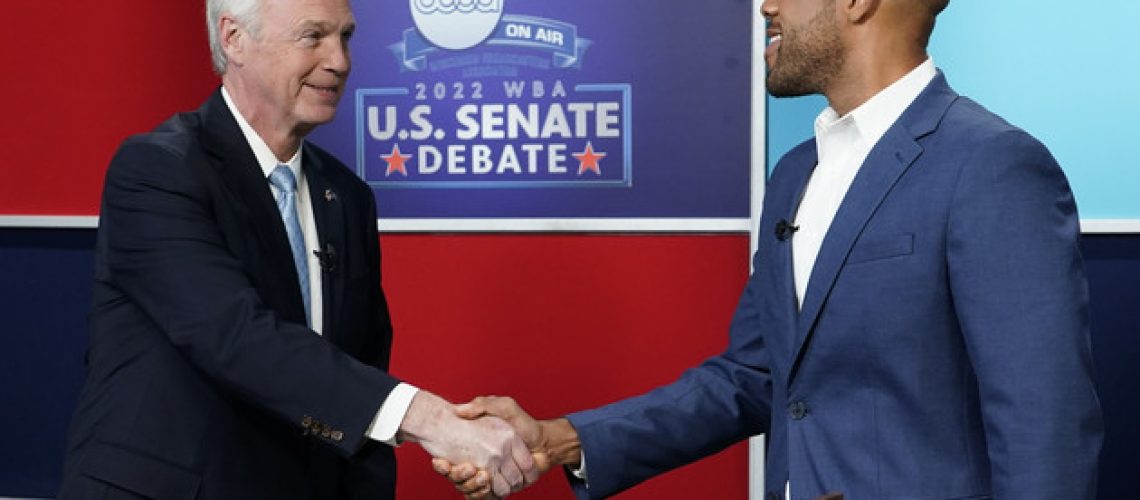In a state known for its beer, cheese, bacon and friendliness, there’s a lot of political tension brewing beneath the surface in the state of Wisconsin.
The close Senate race between Democratic candidate Mandela Barnes and Republican candidate Ron Johnson finally came to a close late Wednesday afternoon with Johnson winning at 50.5% and Barnes sitting at 49.5%.
The outcome of this 2022 midterm race ultimately affects the partisan balance of the U.S. Senate.
“Wisconsin is at the center of the political universe right now,” DNC chair Jamie Harrison said at one of Mandela Barnes’ final rallies for the midterm elections.
Harrison has been serving as DNC chair for a little over a year, but before that, he was the first black democratic state party chair in South Carolina.
On Nov. 6, Mandela Barnes and his campaign crew stopped at the Wyndham Hotel Harborside in Kenosha as part of their final rally tour.
The event was held in a small conference room filled with ‘Mandela for Wisconsin’ signs and eager supporters. In the back, a large photo featured men and women of various races, ethnicities and ages: a representation of the ideal of diversity that Barnes claims to stand for.
But the image didn’t quite seem to reflect the group of people that had gathered for the event — a turnout of mostly middle-aged white folks.
Barnes, an African-American man, was one of the few people of color in the room.
This doesn’t come as a surprise, considering Kenosha County, white non-Hispanics make up 65.7% of the population, a number that doesn’t leave much room for diversity in terms of race.
While diversity may have been lacking, the room was full of people energized about Barnes’ candidacy.
“Wisconsin, are you ready? I said — Wisconsin, are you ready?!” Harrison greeted the crowd before getting into his speech of support for Barnes. Cheers, whistles and applause echoed across the tightly packed conference room.
Before he introduced Barnes, the DNC Chair reflected on a time he had gone out canvassing in a rural area in South Carolina — known for its dirt roads and ‘shotgun houses.’ When he came to the door of one of those houses, he met an African-American man who taught him a lesson on the role of politicians.
Harrison explained that the man had pointed out that the dirt road he had driven up on hadn’t been repaved since it was built under Regan’s administration. Before the man shut the door in Harrison’s face, he said that until the Democrats or Republicans paved his road, he didn’t want to deal with either party.
Harrison went on to explain the importance of having a candidate that will follow through on their promises. In his mind, that candidate is Barnes.
“The superpower for the Republican party is fear and division,” Harrison said. “The superpower for the Democratic party is hope and unity…you elect Mandela Barnes to the United States Senate and he will be your champion for hope.”
After the energy that Harrison brought to the crowd, they cheered for Barnes — but as he approached the stage, he seemed almost stoic.
Once Barnes’ started speaking to the crowd, his passion to get his community out to vote was clear as he reminded the crowd that their voice matters.
“Our last three November elections here in Wisconsin were decided by 30,000 votes or fewer,” Barnes said. “When I tell you that you can absolutely make a difference in the election, I absolutely mean it.”
Barnes touched on the fact that this senate campaign in Wisconsin was one of the most expensive in the history of the state.
According to recent federal campaign reports from October, Barnes’ outraised Johnson by almost $8 million dollars. Despite this fact, he relayed to the crowd that the money Johnson’s campaign was spending on adverting wasn’t working.
“The thing about it is there are no ads saying ‘Thank you, Ron Johnson, for doing this incredible work for us — because he hasn’t,” said Barnes. “It is just wild to believe a person who’s been in office for 12 years doesn’t have a single positive ad about his campaign.”
Barnes’ campaign website highlights rebuilding the middle class, protecting reproductive rights, strengthening unions and safeguarding social security as his priority issues — but he didn’t get into that until after he got some digs in at his opponent.
Barnes touched on issues like rising gas prices. He tied this back into a dig at his opponent claiming that Johnson is standing with executives at oil and gas companies who have made record profits in the last year.
“He’s standing against our interests. He’s standing against more money in the pockets of hard-working people in order to appease his wealthy donors.” Barnes said. “We have a real chance to stop the bleeding that so many communities are dealing with.”
The following afternoon in Waukesha, Wisconsin, Ron Johnson and his campaign crew blamed democrats for the rise in gas prices. Nikki Haley, former U.S. ambassador to the United Nations and former Governor of South Carolina introduced Johnson.
“You know, here the Democrats are talking about democracy being in danger,” Haley said.“They’re talking about all these other issues, but they don’t realize, all we’re saying is when we look at our wallets and we look at our families, we’re trying to figure out what to pay and how to pay it.”
One of Johnson’s final rallies was held outside on fairgrounds in Waukesha. With some sun and a brisk breeze, supporters of Johnson gathered with signs that said ‘save America’ and shirts that said ‘don’t blame me I voted for Trump.’
Racial diversity wasn’t just lacking at the Barnes event, it was also clearly missing at Johnson’s rally as well. This makes sense since white non-Hispanics make up 78.6% of the population in Waukesha.
Once again, while racial diversity may have been missing, the energy and passion the crowd had for Johnson was evident. There was even a democrat that could be found in the crowd proudly wearing a bright blue t-shirt that said ‘Dems4Johnson.’
The biggest similarity that these campaigns shared, was their ability to ridicule and blame the other side. The one stark contrast is not actually between the two candidates, but between the speakers that introduced the candidates.
While Harrison kept it peaceful and only spoke of Barnes and why he was backing him, Haley made it clear that she feels Barnes is not the right man for the job.
Since a major piece of Ron Johnson’s platform is heavily reliant on tackling the rise of crime, Haley used this to draw on the issue that she feels makes Barnes incompetent.
“He would be a nightmare in Congress,” Haley said. “He wants to release half of the inmates in Wisconsin. You look at all the crime, that’s what happens when you glorify criminals and beat up on your law enforcement.”
“Who thought it was a good idea to reduce crime by releasing criminals?” Johnson said. “Not us — that’s them.”
Even though much of the Johnson campaign is centered around this idea of rising crime, recent data from 2020 to 2021, shows that Wisconsin saw a 5.3% decline in violent crime.
“You know what we’re talking about?” Johnson said. “We’re talking about how to fix this country. In particular, how do we unify and heal it?”
However positive his introduction may have been, much like his opponent, Johnson spent the majority of his time talking about how the other side is wrong.
“You know what my opponent, Mandela Barnes, said about the founding of this nation? Awful,” Johnson said. “You’re out here because you think the founding of this nation was something marvelous. It was a crowning achievement in the history of mankind. That’s why you’re here.”
Like Barnes, Johnson had certain issues that he was running behind, like the importance of agriculture, building defense and military, fixing education, health care and foreign affairs.
Ultimately, Johnson took the lead after a very close race. 48 hours before his win, Johnson stepped off his ‘Ron Mobile’ and addressed his crowd of supporters in Waukesha.
“We ought to call this bus the Mandela — because it doesn’t drive itself and it’ll never go to Washington,” Johnson said.


